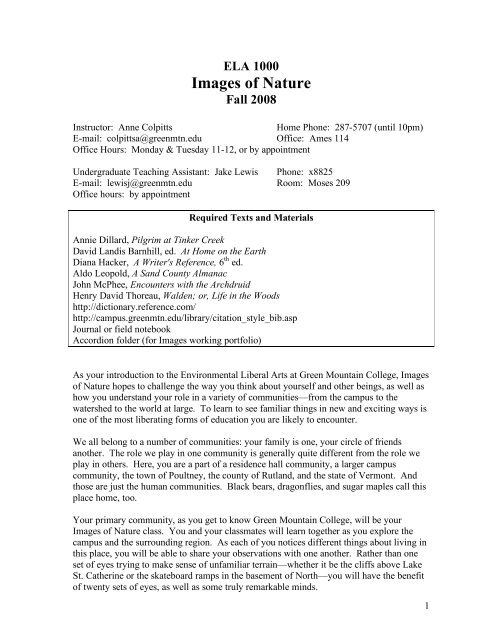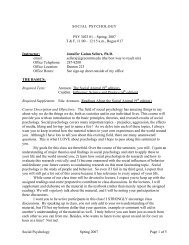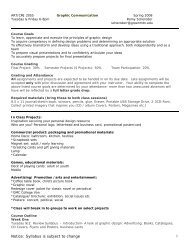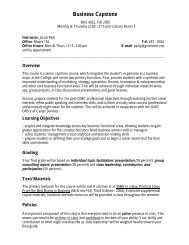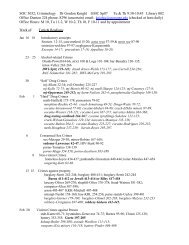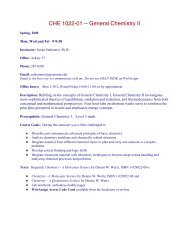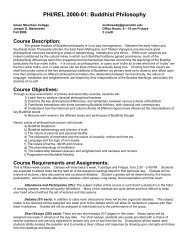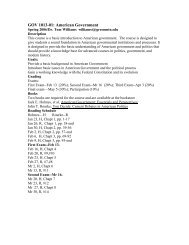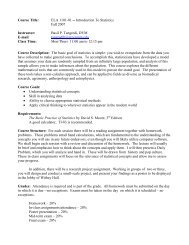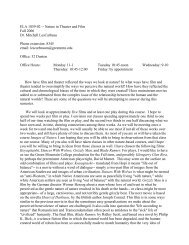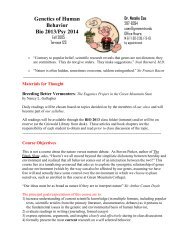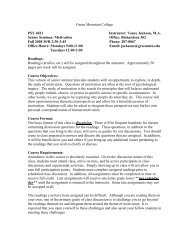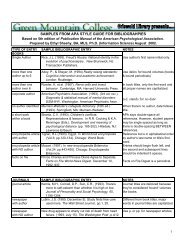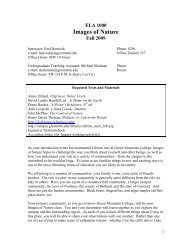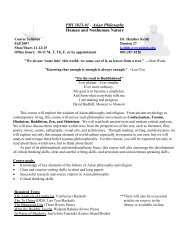Colpitts, Anne - Green Mountain College
Colpitts, Anne - Green Mountain College
Colpitts, Anne - Green Mountain College
You also want an ePaper? Increase the reach of your titles
YUMPU automatically turns print PDFs into web optimized ePapers that Google loves.
ELA 1000<br />
Images of Nature<br />
Fall 2008<br />
Instructor: <strong>Anne</strong> <strong>Colpitts</strong> Home Phone: 287-5707 (until 10pm)<br />
E-mail: colpittsa@greenmtn.edu Office: Ames 114<br />
Office Hours: Monday & Tuesday 11-12, or by appointment<br />
Undergraduate Teaching Assistant: Jake Lewis Phone: x8825<br />
E-mail: lewisj@greenmtn.edu Room: Moses 209<br />
Office hours: by appointment<br />
Required Texts and Materials<br />
Annie Dillard, Pilgrim at Tinker Creek<br />
David Landis Barnhill, ed. At Home on the Earth<br />
Diana Hacker, A Writer's Reference, 6 th ed.<br />
Aldo Leopold, A Sand County Almanac<br />
John McPhee, Encounters with the Archdruid<br />
Henry David Thoreau, Walden; or, Life in the Woods<br />
http://dictionary.reference.com/<br />
http://campus.greenmtn.edu/library/citation_style_bib.asp<br />
Journal or field notebook<br />
Accordion folder (for Images working portfolio)<br />
As your introduction to the Environmental Liberal Arts at <strong>Green</strong> <strong>Mountain</strong> <strong>College</strong>, Images<br />
of Nature hopes to challenge the way you think about yourself and other beings, as well as<br />
how you understand your role in a variety of communities—from the campus to the<br />
watershed to the world at large. To learn to see familiar things in new and exciting ways is<br />
one of the most liberating forms of education you are likely to encounter.<br />
We all belong to a number of communities: your family is one, your circle of friends<br />
another. The role we play in one community is generally quite different from the role we<br />
play in others. Here, you are a part of a residence hall community, a larger campus<br />
community, the town of Poultney, the county of Rutland, and the state of Vermont. And<br />
those are just the human communities. Black bears, dragonflies, and sugar maples call this<br />
place home, too.<br />
Your primary community, as you get to know <strong>Green</strong> <strong>Mountain</strong> <strong>College</strong>, will be your<br />
Images of Nature class. You and your classmates will learn together as you explore the<br />
campus and the surrounding region. As each of you notices different things about living in<br />
this place, you will be able to share your observations with one another. Rather than one<br />
set of eyes trying to make sense of unfamiliar terrain—whether it be the cliffs above Lake<br />
St. Catherine or the skateboard ramps in the basement of North—you will have the benefit<br />
of twenty sets of eyes, as well as some truly remarkable minds.<br />
1
Your professor and your Undergraduate Teaching Assistant (UTA) are here to ease your<br />
adjustment to the experience of being in college, but they will also try to help you<br />
understand what it means to share the northwestern drainage of the Taconic <strong>Mountain</strong>s<br />
with a wildly diverse community of organisms. Any college you might attend would<br />
expect you to spend a part of your first year in courses that prepare you for the written and<br />
oral demands of higher education. Unlike most schools, however, <strong>Green</strong> <strong>Mountain</strong> <strong>College</strong><br />
asks you to develop these skills while considering what it means to belong to one among<br />
many species that make up this amazing community.<br />
An Environmental Liberal Arts education is based on the recognition that humans are<br />
shaped by the environments they inhabit, but also that human actions have a profound<br />
impact on those environments—sometimes with happy results, sometimes with disastrous<br />
consequences. And so, in Images of Nature, you will try out the ideas that you encounter<br />
in your readings and classroom discussions as you explore the land around you. Don’t be<br />
surprised to find your class heading down to the river from time to time. You will also take<br />
longer excursions into the field and an overnight retreat.<br />
Like the other ELA core courses you will take—Voices of Community, Dimensions of<br />
Nature, and A Delicate Balance—Images of Nature wants to encourage a more thoughtful<br />
understanding of your natural and social environments, but there are also a number of<br />
general and specific learning goals to be met through this course.<br />
General Learning Goals<br />
One goal is to help develop your sense of personal responsibility, so that you consider the<br />
effects of your decisions and actions on various communities. You will learn how to be an<br />
effective advocate for the ideas and values that mean the most to you, while also learning to<br />
hear and evaluate alternative viewpoints. Ideally, we will all find ourselves examining our<br />
own ethical and value assumptions as we consider other perspectives, which can instill in<br />
us a greater sensitivity to other species, as well as to people of other races, genders, sexual<br />
orientations, ages, belief systems, and ability levels.<br />
Additionally, your exposure to interdisciplinary knowledge will help you appreciate the<br />
interconnections between all parts of college learning and co-curricular activities, and to<br />
learn to explore issues from multiple perspectives.<br />
The central goal of this course, however, is communication literacy, which requires that<br />
you learn to write clearly, speak effectively, and think critically. You will learn ways to<br />
understand challenging texts, evaluate your interaction with new ideas, and share your<br />
opinions with others. Since communication is increasingly transmitted electronically, you<br />
will also learn to apply these skills to the internet and other media.<br />
2
Specific Learning Goals<br />
While Images of Nature draws its thematic focus from environmental literature, the course<br />
will also make sure that you feel confident with the following skills:<br />
1. Writing Skills<br />
• How to generate ideas for writing (brainstorming, freewriting, evaluating<br />
possible ideas, refining ideas to a more specific level)<br />
• How to understand and use each part of an essay’s structure (introduction,<br />
body paragraphs, conclusion, thesis statement, topic sentences, transitions)<br />
• How to develop strategies for paragraphs (multiple examples; a single,<br />
extended example; analogy and other comparisons)<br />
• How to summarize and cite information from texts<br />
• How to use grammar consistent with principles outlined in A Writer’s<br />
Reference.<br />
2. Reading Skills<br />
• How to identify the main ideas guiding a piece of writing<br />
• How to distinguish between theses and supporting ideas or examples<br />
• How to construct a useful response to something you’ve read<br />
• How to evaluate the strengths and weaknesses of a piece of writing<br />
3. Speaking Skills<br />
• How to listen to the ideas of others<br />
• How to clearly differentiate between facts, opinions, and ideas<br />
• How to develop and maintain vocabulary appropriate to your audience<br />
• How to extrapolate information from varied sources, forming the basis of<br />
an informed opinion<br />
4. <strong>College</strong> Success Skills<br />
• How to adapt to a very new college living environment<br />
• How to navigate the college as an institution and as a community<br />
• How to balance academic and social/cultural demands<br />
• How to maintain personal health and well-being<br />
• How to understand and relate to the local community and our surrounding<br />
natural environment<br />
Reading Assignments<br />
You are expected to have read the assignments listed on your syllabus prior to each class.<br />
To do this to the best of your ability, it may be necessary to read an assignment more than<br />
once. Keeping up with the reading assignments is the key to successful participation in any<br />
college class.<br />
3
Writing Assignments<br />
You will be expected to produce a minimum of 16-20 pages of polished, formal writing,<br />
including at least two source-based papers (4-5 pages) that are fully developed and<br />
correctly documented. The several types of assigned writing will include the following:<br />
• Informal writing may be assigned in class, on field trips, or as homework, and will<br />
often take the form of journal entries. It may be shared in class and will often serve<br />
as the inspiration for more formal writing. It may also be collected, but in any case<br />
you need not worry about “mechanics.” It is only important that the reader can read<br />
your handwriting. Please bring your journal to each class meeting of Images of<br />
Nature.<br />
• Formal response papers are usually at least one page long, typed, and carefully<br />
proofread. These papers may also be shared in class.<br />
• Extended essays will average four to five pages in length, and will bring together<br />
the subjects and skills discussed during the thematic units of the course. The paper<br />
may serve to summarize the ideas presented and build a bridge to the next course<br />
segment.<br />
Portfolios<br />
Throughout the semester, you will keep all of your written work in an accordion folder,<br />
including rough drafts, graded papers, peer reviews, and corrections. This Images<br />
working portfolio will represent the amount of work that you have done for Images of<br />
Nature, and an evaluation of the quality and quantity of writing you put into the course will<br />
account for 25% of your final grade.<br />
You will revise most or all of your essays, and you will choose one of them at midterm and<br />
again at the end of the semester to be submitted in a manila folder as your midterm and<br />
end of term ELA portfolio submissions. Each of these essays should be 4-5 pages long<br />
and include properly documented citations. You will work with your professor, UTA, and<br />
peers (and possibly the Learning Center) to refine these writing samples, producing the<br />
highest quality of work that you are capable of. These ELA portfolio submissions will be<br />
examined by an outside reader (a faculty member from another section) who will evaluate<br />
your work based on a common set of criteria (i.e. a rubric). This portfolio review process<br />
will account for 25% of your final grade.<br />
At the final exam period (Tuesday, Dec. 16 th at 10:30 a.m.), your final ELA Portfolio will<br />
be due electronically. It should contain the following:<br />
• The two 4-5 page, source-based essays submitted for review<br />
• The rubric assessment sheets for those two submitted essays<br />
• A one-page, typed response to each of the two assessments, including a reflection<br />
on your current writing skills and your goals for improving your writing skills<br />
This electronic ELA Portfolio will follow you through your four-year ELA experience.<br />
4
Expectations<br />
Course Requirements<br />
Images working portfolio (all writing done for Images) 25%<br />
Final ELA portfolio (two 4-5 page source-based essays) 25%<br />
Journal 25%<br />
Class attendance and participation 25%<br />
• It is important to note that this is NOT a lecture class. You will be encouraged to listen<br />
carefully both to written and spoken language, respond thoughtfully in writing and<br />
speech, and honestly challenge and discuss ideas you read or hear.<br />
• Your active participation in classroom discussions and outside class experiences is<br />
expected. Active participation means that you are on time, prepared and a willing<br />
participant. I will take attendance each day and more than 3 absences, unless due to a<br />
medical emergency, will negatively affect your grade. Most assignments will be<br />
announced in class and are not listed on the syllabus. If you miss a class, it is your<br />
responsibility to find out what was assigned in that class session.<br />
• Due dates for your assignments will be announced well in advance, and late papers will<br />
be discounted 20%. If you anticipate being unable to meet a deadline, speak with your<br />
instructor before the due date to determine whether other arrangements can be made.<br />
• If you have a specific learning, physical or psychiatric disability and require<br />
accommodations, please let me know early in the semester so that your learning needs<br />
may be appropriately met. If you have not already done so, please register with the<br />
Calhoun Learning Center, the office responsible for coordinating services for students<br />
with disabilities. The Calhoun Learning Center is located on the 3 rd floor of Griswold<br />
Library. If you have questions, please contact Joey Blane, Coordinator of<br />
Accommodations, at x8234.<br />
• All work should be typed and double-spaced unless otherwise noted. Please do not use<br />
a title page. Your name, the instructor’s name, the course section, and the date should<br />
be typed in the upper left-hand corner of the first page.<br />
• For ecological reasons, you are encouraged to print out your work on the back of<br />
previously used paper whenever possible or print double-sided.<br />
• Academic honesty is expected in all class work. A first instance of cheating or<br />
plagiarism will result in a full loss of credit for that assignment. A second instance will<br />
result in failing the course. If you have any doubts about what constitutes plagiarism,<br />
or how to correctly document your sources, please talk with your instructor or UTA.<br />
• The completion of all major writing assignments is a minimum requirement for<br />
passing this course.<br />
5
TENTATIVE CLASS CALENDAR<br />
Dates, activities and assigned readings are subject to change. Readings marked with an<br />
asterisk are common to all sections of Images of Nature<br />
I. SEEING<br />
Goals: Generating ideas for writing; identifying the main ideas in a text; listening to<br />
the ideas of others; recognizing common mistakes in grammar and punctuation.<br />
Week 1<br />
Tuesday, September 2: Introduction to the course<br />
Thursday, September 4: Aldo Leopold, A Sand County Almanac; generating ideas.<br />
Reading: Leopold 3-36*; Hacker 3-9.<br />
Convocation at 4:00.<br />
_____<br />
Week 2<br />
Monday, September 8: Overnight retreat to Half Moon Pond<br />
Tuesday, September 9: (No class) Return from overnight.<br />
Reading: Leopold, A Sand County Almanac, 37-70*.<br />
Thursday, September 11: Aldo Leopold, A Sand County Almanac; identifying main<br />
ideas.<br />
Reading: Leopold 70-98*.<br />
Week 3<br />
Monday, September 15: Plenary: Diane Wilson – 2:30pm in Ackley Auditorium<br />
Tuesday, September 16: Annie Dillard, “Heaven and Earth in Jest.”<br />
Reading: Dillard 3-15*.<br />
Thursday, September 18: Annie Dillard, “Seeing.”<br />
Reading: Dillard 16-36*.<br />
_____<br />
6
Week 4<br />
Monday, September 22: Field trip: Japanese Garden, Hubbarton<br />
Tuesday, September 23: Annie Dillard, “The Fixed.”<br />
Reading: Dillard 55-72*.<br />
Thursday, September 25: (No class) Plenary: Claire Leslie Walker, 6:30pm, the<br />
Gorge<br />
Reading: Annie Dillard, “The Present,” 78-104*.<br />
II. STORIES WE TELL ABOUT NATURE<br />
Goals: Understanding each part of the essay’s structure; distinguishing between<br />
theses and supporting ideas or examples in a text; differentiating between opinions,<br />
facts, and ideas in conversation; strengthening and clarifying your sentences.<br />
Week 5<br />
Monday, September 29: Recycling workshop with Jesse Pyles at 2:30<br />
In-class writing workshop<br />
Reading: Hacker 18-23, Revising<br />
Assignment: Bring draft of 1 st 4-5 page essay to class<br />
Tuesday, September 30: Leslie Marmon Silko, “Landscape, History, and the Pueblo<br />
Imagination”; the structure of an essay.<br />
Reading: Barnhill 30-42<br />
Thursday, October 2: Origin stories; Linda Hogan, “Dwellings.”<br />
Reading: Handouts; Barnhill 313-18<br />
Assignment: First 4-5 page essay due in class<br />
Week 6: Portfolio Preparation<br />
Monday, October 6: Field trip: East Poultney to <strong>Green</strong>e’s Sugarhouse and the<br />
Historical Society (tentative)<br />
Tuesday, October 7: Richard Nelson, “The Gifts of the Deer.”<br />
Reading: Barnhill 125-47.<br />
7
Thursday, October 9: Lynn White, “The Historical Roots of Our Ecologic Crisis”;<br />
David Kinsley, “Christianity as Ecologically Responsible”; distinguishing<br />
between theses and supporting ideas.<br />
Reading: Handouts.<br />
Monday, October 13: Fall Break.<br />
Tuesday, October 14: Fall Break.<br />
_____<br />
Week 7<br />
Thursday, October 16: Visit to Library and Learning Center – 9:30-10:45<br />
Reading: Henry David Thoreau, Walden,1-13*; 26-35*;<br />
Assignment: First 4-5 page portfolio submission due<br />
Saturday, October 18: Welsh Harvest Festival<br />
_____<br />
Week 8<br />
Monday, October 20: Field trip: Deane Preserve for trail maintenance<br />
Tuesday, October 21: Henry David Thoreau, Walden.<br />
Reading: Thoreau 45-47; 53-64*.<br />
Thursday, October 23: Henry David Thoreau, Walden.<br />
Reading: Thoreau 193-206*.<br />
Midterm grades from all faculty due to Registrar<br />
III. WHO’S IN CHARGE HERE?<br />
Goals: Developing strategies for paragraphs; constructing a valid response to<br />
something you’ve read; developing and maintaining vocabulary appropriate to<br />
conversation with an educated audience; using clear transitions.<br />
8
Week 9<br />
Monday, October 27: Portfolio Review-Individual Appointments with Faculty and<br />
UTA<br />
Assignment: Typed, reflective essay on portfolio assessment should be brought to this<br />
appointment<br />
Tuesday, October 28: Portfolio Review-Individual Appointments with Faculty and<br />
UTA<br />
Assignment: Typed, reflective essay on portfolio assessment should be brought to this<br />
appointment<br />
Reading: John McPhee, Encounters with the Archdruid. 3-43.<br />
Thursday, October 30: Portfolio Review-Individual Appointments with Faculty and<br />
UTA & Class Visit to Career Services – 10:15-10:45<br />
Assignment: Typed, reflective essay on portfolio assessment should be brought to this<br />
appointment<br />
Reading: John McPhee, Encounters with the Archdruid, 43-75; strategies for<br />
paragraphs. Hacker 24-37.<br />
_____<br />
Week 10: Advising for spring registration<br />
Monday, November 3: Individual advising appointments<br />
Tuesday, November 4: John McPhee, Encounters with the Archdruid.<br />
Reading: McPhee 79-118.<br />
Thursday, November 6: John McPhee, Encounters with the Archdruid.<br />
Reading: McPhee 118-50.<br />
_____<br />
Week 11: Registration Week<br />
Monday, November 10: Field Trip – Slate Quarry (tentative)<br />
Tuesday, November 11: John McPhee, Encounters with the Archdruid.<br />
Reading: McPhee 153-204.<br />
Thursday, November 13: John McPhee, Encounters with the Archdruid.<br />
Reading: McPhee 204-45.<br />
9
IV. THE LAND ETHIC<br />
Goals: Summarizing and citing examples from a text; evaluating the strengths and<br />
weaknesses of something you’ve read; extrapolating data from varied sources in<br />
conversation; revising your own writing.<br />
Week 12<br />
Monday, November 17: In-class writing workshop; Plagiarism Workshop – 4:15-5:00<br />
Assignment: Bring draft of 2 nd 4-5 page essay to class<br />
Tuesday, November 18: Aldo Leopold, “Thinking Like a <strong>Mountain</strong>”; “Round River”<br />
Reading: Leopold 137-45*; 188-202; Hacker 318-22.<br />
Thursday, November 20: Aldo Leopold, “The Land Ethic”<br />
Reading: Leopold 237-64*.<br />
Assignment: Second 4-5 page essay due in class<br />
_____<br />
WEEK 13<br />
Monday, November 24: Movie: Into the Wild<br />
Tuesday, November 25: Gary Snyder, “The Place, The Region, and The Commons”;<br />
Thomas Berry, “The Hudson River Valley: A Bioregional Story.”<br />
Reading: Barnhill 93-110.<br />
Thursday, November 27: Thanksgiving Break.<br />
Monday, December 1: TBA<br />
_____<br />
Week 14: Portfolio Preparation<br />
Tuesday, December 2: Rick Bass, “On Willow Creek”; Alan Thein Durning, from<br />
This Place on Earth: Home and the Practice of Permanence;<br />
Reading: Barnhill 211-26; 256-65.<br />
Thursday, December 4: Terry Tempest Williams, “A Sprig of Sage”; Richard Rodriguez,<br />
“Nothing Lasts a Hundred Years”<br />
Reading: Barnhill 119-24, 266-288<br />
Assignment: 2 nd 4-5 page portfolio essay due<br />
10
Monday, December 8: TBA<br />
Week 15<br />
Tuesday, December 9: Scott Russell Sanders, “Settling Down”; David Mas Masumoto,<br />
“Learning to Fail”;<br />
Reading: Barnhill 77-92; 191-200.<br />
Thursday, December 11:<br />
Alice Walker, “The Universe Responds: Or, How I Learned We Can Have Peace on<br />
Earth.”<br />
Reading: Barnhill 307-312.<br />
Assignment: Reflective essay on second portfolio assessment (portfolios returned in<br />
class) – DUE ON THE DAY OF THE FINAL<br />
Finals Week<br />
Tuesday, December 16 at 10:30 am: We will meet for an in-class writing assignment<br />
during the final exam period.<br />
Due:<br />
1. Final ELA portfolio submitted electronically.<br />
2. The student’s entire Images working portfolio in an accordion file, including<br />
all rough drafts and final versions of all papers from the course.<br />
3. The student’s journal.<br />
11


